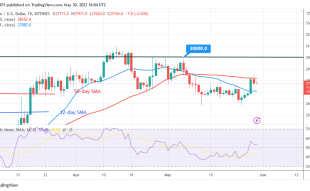Join Our Telegram channel to stay up to date on breaking news coverage
Recently, Bitcoin mining has been at the centre of attention as a potential beneficiary in a crucial negotiation. According to Ohio lawmaker Warren Davidson, the Biden administration’s proposal to impose a 30% tax on Bitcoin mining was shelved in a debt ceiling deal on Sunday.
Further, the deal is expected to scrap a proposed tax on the energy consumption of these miners. This development brings hope to the cryptocurrency community. This is because it could remove a significant hurdle for Bitcoin miners and pave the way for continued growth and innovation in the crypto ecosystem.
Lawmakers Introduce Bill To Suspend U.S. Debt Ceiling
Recently, the U.S. lawmakers unveiled a preliminary draft of a bill that addresses the pressing issue of the debt ceiling. This includes a limit on how much money the government can borrow to fulfil its financial obligations.
In the details of the agreement reached between President Joe Biden and House Speaker Kevin McCarthy on the U.S. debt ceiling, one significant part of the deal appears to have blocked some taxes proposed by the Biden administration. This includes the Digital Asset Mining Energy (DAME) excise tax.
The disputable Digital Asset Mining Energy (DAME) tax has notably garnered widespread criticism in the crypto industry. The White House wishes the tax would address the environmental cost of Bitcoin mining, including its harmful spillover effects on the environment and electric grids. However, crypto-mining advocacy groups have argued that the tax would only drive the industry offshore.
If passed, it would impose a 30% tax on cryptocurrency mining firms—a move that the Biden administration argued required limiting the environmental and societal damage caused by crypto mining operations. Nonetheless, Biden expressed a desire for the bill to include provisions for tax increases targeting corporations and high-income individuals. However, the latest draft suggests that these tax hikes are unlikely to be included in the bill’s final version. The absence of such tax increases could be seen as a concession to gain broader support for the legislation.
The Bitcoin Mining Industry
On the other hand, Pierre Rochard, V.P. of Research at Riot Platforms, questioned whether “the Administration’s DAME excise tax proposal is gone?” given that Bitcoin mining wasn’t mentioned in the text of the bill, dubbed the “Fiscal Responsibility 5 Act of 2023.” The U.S. Congressman Warren Davidson (R-OH-08) replied, saying, ”Yes, one of the victories is blocking proposed taxes.”
I searched through the document, no mention of bitcoin mining, does this mean the Administration’s DAME excise tax proposal is gone?
— Pierre Rochard (@BitcoinPierre) May 29, 2023
However, the White House may find another way to introduce the bill in an upcoming statement.
Significantly, the White House has firmly stated its position that mining exacts an environmental and social toll that it wants mining companies to pay:
“Crypto-mining firms do not have to pay for the full cost they impose on others, in the form of local environmental pollution, higher energy prices, and the impacts of increased greenhouse gas emissions on the climate. The DAME tax encourages firms to start taking better account of the harms they impose on society.”
Implementing an energy tax for digital asset mining was initially introduced in March of this year. The DAME tax intended to apply to both Proof-of-Work (PoW) networks like Bitcoin and Proof-of-Stake (PoS) networks like Ethereum. This is by disregarding the substantial differences in their energy consumption levels.
However, in the proposed tax framework, digital asset miners must disclose information such as the amount of electricity they consume, the source, and its corresponding value. This requirement would extend to off-grid power generation, including utilizing otherwise wasted natural gas.
The Crypto Community
In a report released recently by the White House, the Biden administration reiterated that imposing financial constraints on miners is in the best interest of American communities and the environment.
However, various crypto enthusiasts criticized the proposal. Earlier this month, the Democratic Presidential Candidate, Robert F. Kennedy Jr., noted via Twitter that ”Bitcoin mining uses about the same as video games, and no one calls for a ban on those. The environmental argument is a selective pretext to suppress anything threatening elite power structures.”
Cryptocurrencies, led by bitcoin, along with other crypto technologies are a major innovation engine. It is a mistake for the U.S. government to hobble the industry and drive innovation elsewhere. Biden’s proposed 30% tax on cryptocurrency mining is a bad idea. ?
— Robert F. Kennedy Jr (@RobertKennedyJr) May 3, 2023
Notably, the Republican Senator Cynthia Lummis also gave her remarks concerning the proposal in the recent Bitcoin 2023 conference. She asserted that a thriving Bitcoin mining industry is not only a matter of national security but also an issue of energy security.
Further, she urged Bitcoin enthusiasts to participate in groups that advocate for the world’s largest cryptocurrency as part of the U.S. economy. Additionally, Senator Lummis also expressed conviction that the proposed energy tax “isn’t happening.”
Biden administration stated that a 30% tax on cryptocurrency mining companies was necessary to reduce environmental and societal harms caused by crypto mining activities. Further, if the bill succeeds, that tax would be imposed. Nonetheless, the legislative body is scheduled to convene and vote on the proposed legislation on May 31.
More News:
- Biden Administration Seeks To Tax Crypto Mining For ‘Harm’ On Society
- Famous Trader Talks About a Major Bitcoin Signal Nobody Has Noticed Yet
- Former Coinbase CTO Warns US Government May Block Bitcoin Withdrawals
Join Our Telegram channel to stay up to date on breaking news coverage


